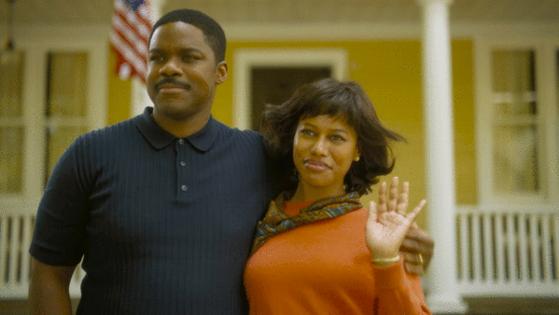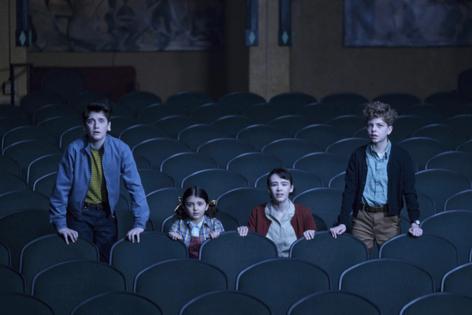Q&A: 'It: Welcome to Derry' has scary monsters. But the real horror is closer than you think
Published in Entertainment News
LOS ANGELES — A mutant killer baby. Lampshades and pickle jars that come alive. Sinister sewers. A demonic clown that preys on children.
HBO Max's "It: Welcome to Derry," the latest adaptation of Stephen King's epic 1986 novel about a deadly clown named Pennywise, has already scared up a lot of buzz since its Oct. 26 premiere with its mix of evil events and nightmarish images.
The first episode featuring Robert Preston warning "Ya Got Trouble" via the classic musical "The Music Man" is an ominous introduction to the subsequent terrors. Gruesome sequences revolving around birth in the first two episodes will likely make several viewers cover their eyes. (The second episode dropped Friday on HBO Max in time for Halloween, and it will air in its usual 9 p.m. ET Sunday slot on HBO.)
A prequel to 2017's "It" and 2019's "It: Chapter Two" — both directed by Andy Muschietti — the new drama is set in 1962 in the fictional small town of Derry, Maine. Bill Skarsgård, who played Pennywise in the films, will reprise his role during the season.
The large ensemble of child actors and adults features several Black characters, including Air Force Maj. Leroy Hanlon (Jovan Adepo); his wife Charlotte (Taylour Paige), a civil rights activist in a Jackie Kennedy pillbox hat; and son Will (Blake Cameron James). Also featured is Hank Grogan (Stephen Rider), the town's theater projectionist, and his teen daughter Ronnie (Amanda Christine).
Developed by Muschietti, his sister Barbara Muschietti and Jason Fuchs, the creators have prioritized increasing the intensity of the films. But the Muschietti siblings add that they are also incorporating certain messages into the mayhem. Many of the Black characters face bigotry and resistance in the predominantly white town that echo challenges that people of color currently face.
"Stephen is a master of weaving these issues into his stories, and it's impossible to think of doing one of his stories without having that texture front and center," Barbara Muschietti said.
The Muschiettis, in a video call, discussed diving deeper into the story of Pennywise, getting their young cast to act like kids from the 1960s, and what gives them nightmares. This interview has been edited for length and clarity.
Q: How soon after the two "It" movies did the idea of a deeper dive into the world of Pennywise come about?
Andy Muschietti: The novel was the inspiration. There are all these enigmas still lingering, enigmas intentionally left unresolved in the book. Part of the greatness of the novel is that you finish 1,200 pages and at the end, you still have no idea what "It" is and what it wants. It's all speculation. We had conversations with Bill about how great it would be to do an origin story of Bob Gray, this cryptic character, and give him the opportunity to play the human side, the man behind the clown. It's about completing the puzzle and uniting the stories that lead one to another, creating a story with the final purpose of getting to this conclusive event, which is the creation of Pennywise, the incarnation of evil.
Barbara Muschietti: Once the idea start percolating, we got in touch with Mr. King and he loved the idea. At the beginning of the pandemic we went to (then-Warner Bros. TV chief) Peter Roth. He bought it in the room and we've been on it ever since. Not a day of rest.
Q: "The Music Man" plays a prominent role in the first episode, and it gets dark pretty quickly. I'm a huge fan of that movie, and I don't know if I'll ever be able to look at that joyful musical the same way again.
Andy Muschietti: I actually wanted us to create a musical ourselves that would pretend to be a movie from 1962. But we would have spent so much money and energy. So we started a quest for the right musical. "The Music Man" was made by Warner Bros. in 1962, and it's about someone coming to a small town not unlike Derry, talking about trouble, trouble. And it just seemed to fit.
Barbara Muschietti: We also hope a lot of younger people will be curious and go see "The Music Man."
Q: What is the superpower of "It" that makes it a story that keeps giving and giving?
Andy Muschietti: There are a lot of things people connect to. One of them is childhood. Most of us cherish those years as being full of magic and imagination. We've all been children and we've all been afraid of something. The novel is a testament to the virtues of childhood, and those virtues normally disappear when you become an adult. Arguably the adults are always the enemy in the world of 'It.'"
Apart from the clown, there's a whole mythology that has yet to be connected. My purpose in this series is to reveal the iceberg under the water.
Q: You could not have planned the timing of the show coming on, but it seems like the topical issues addressed in this show, like bigotry, have a relevance to what's going on in the country today.
Andy Muschietti: What's going on is not new. It's just found a new expression. It has been going on and on in cycles. We have this illusion that things are good, but around the corner is another dictator trying to come. We came from Argentina, and we don't have the kind of racial tension that America has had for hundreds of years. Most of Stephen's books are a song to empathy in general, and denouncing injustice everywhere. It is important to show, especially in an era where some people in the country are trying to delete history.
Barbara Muschietti: Sadly, these horrors keep haunting us, and racism, antisemitism, Islamophobia is still sadly a human condition, needing to find someone below you that you can punch. Yes, our history makes us a little more sensitive. We live in the United States, it's a country we love, but it is surprising ...
Andy Muschietti: Alarming.
Barbara Muschietti: ... that more people are not more concerned.
Andy Muschietti: It's the fog that Stephen King was talking about. People, basically out of fear, look the other way, trying to suppress things they see, and forget. It's all part of the same reflection.
Q: It's immediately obvious that some horrific things will be happening in this show, even more so than the films. The imagery is really nightmarish.
Andy Muschietti: Being a shape-shifter is the thing which keeps giving and giving, and there was a clear intention for us to raise the volume of intensity. You need to meet the expectations of the audience — they don't want to see more of the same. And we are also dealing with a different time when the collective fears were different because of the social and political situation of that era — the Cold War, the Cuban Missile Crisis — was just around the corner. Then there's social unrest and segregation.
Barbara Muschietti: I'd like to say it's all very cathartic. We're very nice people. I swear.
Q: The show also has a great feel and look to it when it comes to depicting the 1960s.
Andy Muschietti: There was a lot of instinctive respect and attention to accuracy, aesthetically and spiritually. It was the true work of a team in every department, the same folks who had worked on the movies. There was also the research from the writers.
Q: Most of the cast members are kids who did not live in that era. How do you communicate that era and feel to a young cast?
Andy Muschietti: There is a lot of talking. Stephen King knows a lot about this because he was a kid in the 1950s. The book is so rich in detail. We have Ben Perkins, who is a child actor coach. And there is imagination. These kids like to play and at this age, they thrive when you don't put a lot of restrictions on them. The only thing that went overboard was the cursing.
Barbara Muschietti: That's one thing that Stephen came back to us with. "There's too many f—." We also send the kids with Ben who basically sets up a camp — a bicycle riding camp, a swimming camp, stuff like that which kids in 2024 did not have access to. We've been doing that since 2016 very successfully. Because of all of this, all these kids have an incredible bond. They're friends for life. They get to say goodbye to adolescence on our sets in the most beautiful way.
Q: How long will you keep expanding the "It" universe?
Andy Muschietti: It's Derry, Derry, Derry all day. "Welcome" is an arc that expands over three seasons. Why is "It'" Derry, and why is Derry "It"? We will eventually reveal a bigger story revolving around the existence of Pennywise.
Q: I have to ask — what gives you two nightmares? What is scary to you?
Barbara Muschietti: Fascism. Guns.
Andy Muschietti: Violence in general. We've come so far as a civilization, and it seems like we haven't learned anything. What happened to empathy, and seeing what makes us similar, instead of things that divide us?
Barbara Muschietti: And love and respect.
©2025 Los Angeles Times. Visit latimes.com. Distributed by Tribune Content Agency, LLC.
















Comments